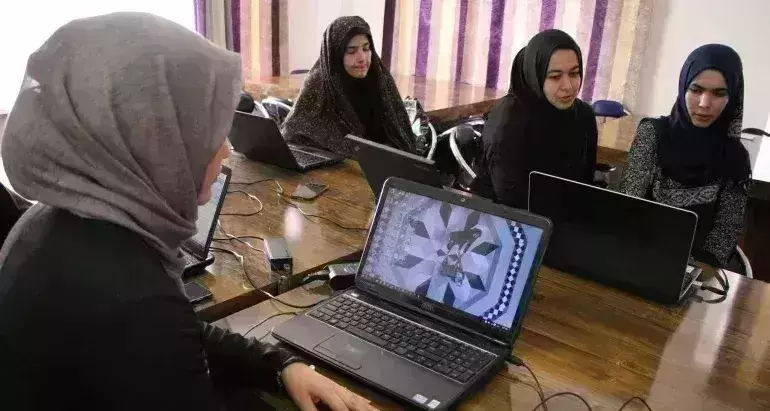
Senior Taliban figure says women should not work alongside men
text_fieldsImage credit: Reuters
New Delhi: Despite the Taliban's promises to preserve women's rights after capturing control of Afghanistan last month, a senior figure from the militant group has now said that Afghan women will not be allowed to work alongside men.
The decision if formally implemented, would effectively bar them from employment in government offices, banks, media companies and beyond.
Waheedullah Hashimi, a senior figure in the Taliban who is close to the leadership, told Reuters the group would fully implement its version of sharia, or Islamic law, despite pressure from the international community to allow women the right to work where they want.
Since the movement swept to power last month, Taliban officials have said women would be able to work and study within the limits laid down by sharia.
But there has been widespread uncertainty about what practical effect that will have on their ability to keep their jobs. When the Taliban last ruled Afghanistan from 1996-2001, women were barred from employment and education.
"We have fought for almost 40 years to bring (the) sharia law system to Afghanistan," Hashimi said in an interview. "Sharia ... does not allow men and women to get together or sit together under one roof.
"Men and women cannot work together. That is clear. They are not allowed to come to our offices and work in our ministries."
It was unclear to what extent Hashimi's comments reflected the new government's policies, although they appeared to go further than public comments made by some other officials.
In the days following the Taliban's conquest of Kabul, Taliban spokesman Zabihullah Mujahid told reporters that women were an important part of the community and they would work "in different sectors".
He also specifically included women employees in a call for government bureaucrats to return to their jobs.
However, the cabinet appointments announced on Sept. 7 did not include any women and there have been widespread reports of women being sent back home from their workplaces.
Hashimi said the ban on women would also apply to sectors like media, where women have become increasingly prominent since the Taliban fell in 2001 and a Western-backed government was installed.
Contact between men and women outside the home will be allowed in certain circumstances, for example when seeing a male doctor, he added.
Women have staged several protests across Afghanistan, demanding that the rights they won over the last two decades be preserved. Some rallies have been broken up by Taliban gunmen firing shots into the air.

















